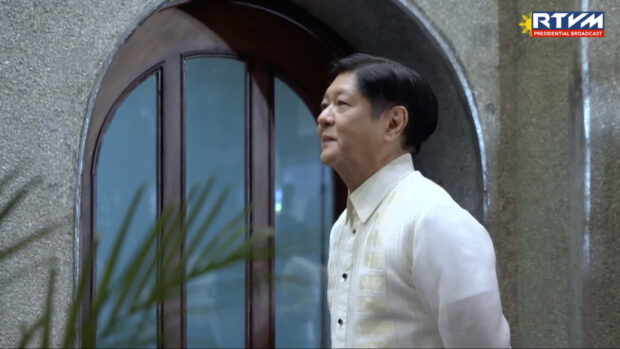
President Ferdinand Marcos Jr. (Photo from RTVM)
MANILA, Philippines — Fresh from a state visit to entice investments from Malaysia, President Ferdinand Marcos Jr. on Friday met in Cebu City with foreign investors in the country and promised them he would address their concerns over taxes.
“We’re working on those issues,” the President said during the Apec (Asia-Pacific Economic Cooperation) Business Advisory Council (Abac) meeting at the NUSTAR Resort and Casino.
“We will be introducing amendments to the [Corporate Recovery and Tax Incentives for Enterprises, or CREATE],” he said after meeting with officials of Marubeni Corp., the oldest sogo shosha in the country.
When Congress passed the CREATE law at the height of the pandemic lockdown in 2021, it was touted as a “historic” tax reform that would cut personal and corporate income tax rates to competitive levels. Zero-rated personal income tax brackets were increased to favor low-income individuals, but still way below the zero-rated tax bracket in Singapore and practically the same with most of Southeast Asia.
The old corporate income tax rate of 30 percent used to be the highest in the region, and it was indeed cut to 25 percent, but only to the level of Thailand and Vietnam and still higher than Brunei and Singapore.
2nd highest VAT in region
Indirect taxes, like value-added and general sales taxes, are much worse.
The Philippine VAT of 12 percent is still the second-highest in the region, next only to Myanmar, and the government is currently looking to impose even more VAT on other services, particularly in the digital space.
Aside from Marubeni, the Australian shipbuilder Austal Limited, which has been building commercial vessels in Balamban town in Cebu for years, also complained about VAT and asked the President for an exemption on locally built vessels.
Marcos seemed already aware of the issues and urged foreign investors to propose changes in the CREATE law.
“If you have your own amendments, we’d like to see,” Marcos said. “We will be happy to look at them. I want to hear from everyone what their ideas are, or even just, from your experience in other countries, what has worked for you.”
Aside from taxes, investors were also concerned with the ease of doing business.
Japanese shipbuilder Tsuneishi Heavy Industries, in a joint venture with the Aboitiz Group, was instrumental in transforming Balamban town into one of the most dynamic areas in the country. There are now pending proposals to grant it a city charter.
The company reclaimed land and built a shipyard in the town, facing Negros Oriental across the Tanon Strait, and started producing and repairing hundreds of vessels every year with thousands of direct and indirect Filipino employees.
But Tsuneishi cannot get clearance to expand its reclamation in Balamban, although it was granted the permit in 2008. Local fisherfolk are worried that the shipyard may affect their catch, aside from concerns about the environment.
In his meeting with Tsuneishi officials, Marcos said he would talk to Environment Secretary Ma. Antonia Yulo-Loyzaga regarding their project.
“I’ll talk to Secretary [Yulo-Loyzaga] and I think that they’re undergoing that review process already. Because we have to be very careful,” he told Tsuneishi executives.